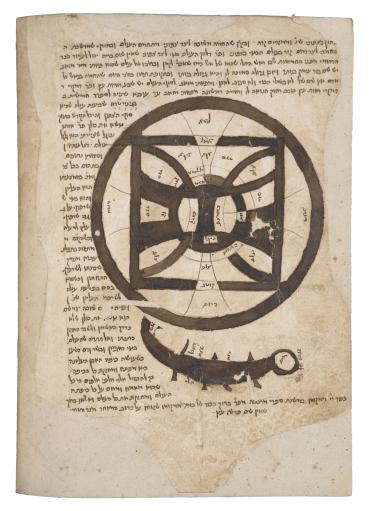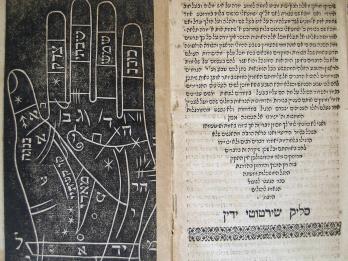She‘are kedushah (Gates of Holiness)
Ḥayim Vital
First Half of the 17th Century
Chapter Four, Gate Two
You already know that concerning all matters of supernal attainment, one needs to be alone in his house so that others will not disturb his thought, and he himself needs to engage in hitbodedut [contemplation] within his thoughts. He should strip his body from his soul, so that he does not feel at all that he is clothed in matter, but rather that he is singularly a soul alone. The more he abstracts himself from matter, the more his mental perception becomes strong. And if he feels that some noise or some movement is canceling out his thought, or if within himself should come some type of rumination on a material issue, then indeed the thought of his soul will cease from conjoining with the upper entities and he will not attain anything, because the upper holiness does not rest upon man when he is conjoined with matter, even if it is as small as a hairsbreadth. This is why prophecy, or the Holy Spirit, is called a “deep sleep,” or “dream,” or “vision.” In sum, even if a man is worthy of having the Holy Spirit rest upon him, if he does not ready himself for this by completely removing his soul from his body, then the spirit will not rest upon him. This is the secret of the prophets, who had a drum and a flute, etc. [see 1 Samuel 10:5], for by means of the sweetness of the sound of the playing of instruments they entered into a state of hitbodedut, precisely through the pleasantness of the sound. Their souls became divested of matter, and then the player of the instrument stopped playing, and the prophets remained in the same state of conjunction with the upper entities and prophesized. Behold, this is the first condition for supernal attainment.
The second condition is that one should negate all those things that might cause a break in one’s state of hitbodedut, for in relation to the first condition, we only mentioned material things that will naturally cause a break in the state of hitbodedut. Now, however, we are talking about spiritual things that cause a break in the state of one’s hitbodedut, and these are the powers of impurity that derive from the evil inclination that clothes itself within man himself; these powers are strengthened by the sins of man.
Thus, one who wishes to engage in hitbodedut should first repent for all of his sins, and afterwards should take care not to add any more sins to them, and subsequently he should perform exercises in order to remove the evil attributes that are embedded within him, such as the attribute of anger, sadness, impatience, idle chatter, and other such attributes. After he has corrected the sicknesses of his soul, both in terms of sins and in terms of attributes, then no power is left for the spirit of impurity to stop his conjunction with the upper entities. At this point, he should practice nullifying material objects in relation to himself, as mentioned above in the first condition. After all this, he should engage in actions that draw him to conjunction with the upper entities, as will further be clarified with the help of God, according to that which I have found in books and in the words of those who have successfully engaged in hitbodedut. Indeed, this second condition, which is that one should distance himself from the powers of impurity by repentance from his individual sins and by distancing from improper attributes, has already been clarified in the first mode, according to that which I have found in books. And after I have taught you about these two conditions mentioned, I shall now remind you of the actions by way of which the soul of man can conjoin with the upper entities, after it has first fulfilled the two mentioned conditions:
Engage in hitbodedut alone in a house, as I mentioned above, wrap yourself in a tallit, sit, and close your eyes. Strip yourself of matter as if your soul has gone out of your body and has risen to the firmament. After this divestment from matter, read one mishnah, whichever one you want, many times over, one after the other, with the greatest speed possible while maintaining clear enunciation and without skipping any words. Intend to join your soul with the soul of the Tanna mentioned in that specific mishnah. Do this by intending that your mouth be a tool for the expression of the letters of the language of that mishnah. The voice that you express by way of the tool of your mouth is a spark of your internal soul that comes forth and reads that mishnah; it is made into a chariot within which the soul of the Tanna who is associated with that mishnah is clothed. His soul will clothe itself inside of your soul, and when you become tired in your reading of the mishnah, then if you should so merit, it is possible that the soul of that Tanna will rest upon your mouth and will be enclothed there for the duration of the reading of the mishnah. Then, for the duration of the reading of the mishnah, he will speak from within your mouth, and he will extend a greeting to you, and then anything that you think in your thoughts to ask of him, he will answer you. He will speak with your mouth and your ears will hear his words; you yourself are not speaking, but he is speaking. And this is the secret of the verse: The spirit of the Lord spoke within me and His word was on my tongue (2 Samuel 23:2).
Credits
Published in: The Posen Library of Jewish Culture and Civilization, vol. 5.





